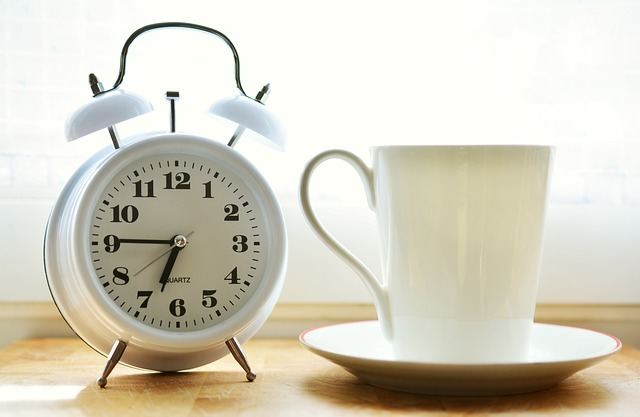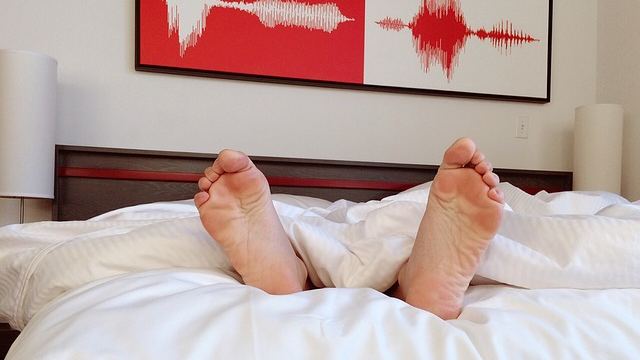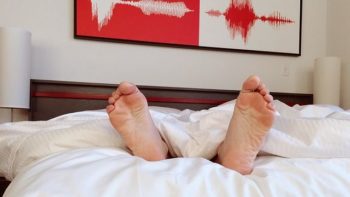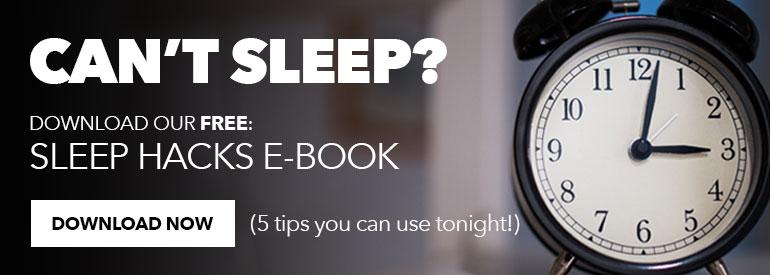 Reading Time: 7 minutes
Reading Time: 7 minutesMany people like to think of themselves as knowledgeable about what they can do to live healthy lives. They don’t smoke, they exercise, eat well, avoid GMOs — and yet, a lot of these same people would also scoff at the mere suggestion that they might not be getting enough sleep.
But according to the latest science, many of us are dangerously short on sleep. So let’s take a fresh, research-based look at sleep and your long-term health. We’ll look at:
- Why sleep is so important
- How we could be negatively impacting our long-term health when we don’t get enough
- Some simple ways we can improve our sleep starting today
How Much Sleep Do We Need?
Everyone is different, so there isn’t a single magic number of hours you need to sleep every night. Some might need a bit more time in bed, others a bit less. For an adult, the American Academy of Sleep Medicine (AASM) recommends sleeping about seven to eight hours every night under normal circumstances. Any less or even more could have a negative impact on your health. This time may go up in younger adults (children and teenagers need more sleep), in those overcoming illness, and in those recovering from a sleep deficit.

Are We Sleeping Enough?
Unfortunately, many of us aren’t. According to a study by the Centers for Disease Control and Prevention (CDC), over a third of adults don’t get enough sleep. Moreover, almost 40% of adults also report falling asleep unintentionally during the day at least once a month.
As modern life has become more hectic, we are sleeping less than we were two decades ago. In our bustling, fast-paced world, many people see sleep as a necessary evil — a waste of time when they could be doing other things, whether for work or pleasure.
Even our bedtime routine has changed in modern years. How many of us will lie in bed and watch a couple of episodes on TV before sleeping? Or maybe just scroll through our Facebook feed? As it turns out, this simple habit many have developed can also keep you up at night by tricking your brain into thinking it’s still daytime by disrupting your body’s internal clock, known as the circadian rhythm.
The Short-term Effects of Sleep Deprivation
Many people deprive themselves of sleep not for recreation but for work purposes saying they don’t have the time to sleep more than a few hours a night. In many cases, the reality of the situation is that if these individuals did get the sleep their bodies crave, they might be able to finish their work more quickly and even end up with a higher quality finished product.
It’s a vicious cycle in which more work means you get less sleep, but less sleep makes your work take longer, leading to less sleep.
While a day or two without adequate sleep shouldn’t do much harm, sleep deprivation even over a short period of time (e.g. a week) could significantly affect daily aspects of your life. Drowsiness, moodiness, anxiety, and finding it difficult to stay alert are all symptoms of sleep deprivation. Others include forgetfulness, decreased attention span, and cognitive impairments (not being able to think straight).
So it’s easy to see how these then lead to decreased performance at work (and a not very fun person for anyone to be around).

The Long-term Effects of Sleep Deprivation
Although difficult to study in humans for ethical reasons — you can’t keep someone awake for weeks at a time — there is evidence that indicates habitually sleeping for shorter durations than needed is associated with greater mortality:
- It’s known that losing sleep is associated with cardiovascular diseases. These include heart attacks and strokes, among others, and are often fatal or life-changing.
- Various cancers are associated with decreased sleep, such as prostate cancer, breast cancer, and colorectal cancer. In fact, women with longer sleep durations (over nine hours a day) have been found to have a decreased risk of breast cancer. It’s not known why sleep deprivation increases cancer risk, but one possibility is that suppression of melatonin (a molecule that regulates sleep) due to more time awake or exposure to light at night may promote cancer cell development.
- Another serious risk of sleep loss arises from the daytime fatigue that affects both cognitive and motor function, resulting in human errors. While these aren’t always serious, the biggest danger is when driving. In a survey by the National Highway Traffic Safety Administration, a whopping 37% of individuals stated they’ve fallen asleep at the wheel at least once, and 8% admitted to having done so in the prior six months. Even higher percentages of drivers confessed to driving drowsy, struggling to keep their eyes open.
- In addition, work-related injuries and fatalities are also more common in sleep-deprived people, particularly in those working around dangerous equipment.
Yet another consequence of sleep deprivation to note, particularly for those trying to lose weight, is that losing sleep is associated with obesity. One study showed that sleeping less than five hours a night could increase the odds of obesity by 1.5 times. Other research has also shown that reduced sleep could lead to impaired glucose tolerance and increased risk of type 2 diabetes.

The Benefits of Getting Enough Sleep
Besides the avoiding all those risks, there are also gains to be made from getting enough rest:
- Various important hormone levels are controlled while we sleep, such as ghrelin and leptin, which dictate when you feel hungry or full. Moreover, sleeping is an essential part of keeping your immune system healthy and able to fend off infections.
- An essential part of retaining new information is a good night’s sleep. As we sleep, our brains create new, stronger pathways to the information we learned, allowing us to recall that information with greater ease and accuracy.
- Additionally, sleep not only helps us retain information but also to create new ideas and solutions to problems — ever wake up in the middle of the night with some great idea you’ve just dreamed up? Well, you can thank sleep for that.
- Sleep is a key aspect of physical and physiological recovery. Every day, your body goes through a lot, and sleep is the only opportunity for the body to repair itself. Your heart and blood vessels undergo healing during sleep and a number of toxins built up in the body during the day are metabolized and removed.
- Adequate sleep helps you get the most out of your exercise route. Getting proper recovering through nutrition and sleep allows your muscles to grow bigger and stronger. But this recovery will only occur if you give your body time, i.e. actually get some sleep. Research found that when compared to sleep-deprived individuals, people who get good-quality sleep tend to be stronger.
How to Get More Sleep
Of course, we’re all unique, so different methods will be ideal for different people. But here are a few ways that might help you get a better night’s sleep:
- Have a set time to go to sleep and wake up every day and stick to it. This should be about the same on weekends as on weekdays so your internal clock will not be disrupted.
- Incorporate physical activity into your day to prevent you feeling restless at bedtime.
- Avoid big meals and caffeinated drinks just before sleep.
- Your room should also be relaxing and cool. It’s far easier to fall asleep in a soothing environment than one filled with mental stimulation.
- Avoid staring at bright sources of artificial light (e.g. phone, computer monitor) for about an hour before sleep.
- Various relaxation methods and breathing techniques can be used to help you fall asleep faster.
The best thing you can do is experiment and slowly develop your own perfect bedtime strategy to help you fall asleep and get your required hours of sleep.
Sleep and Your Long-Term Health
At the end of the day, sleep is truly an underrated part of our lives. So many aspects of our health are affected by it, yet we often fail to recognize its value. We need to remember there really isn’t any valid excuse to sacrifice our sleep, despite how we may convince ourselves otherwise.








